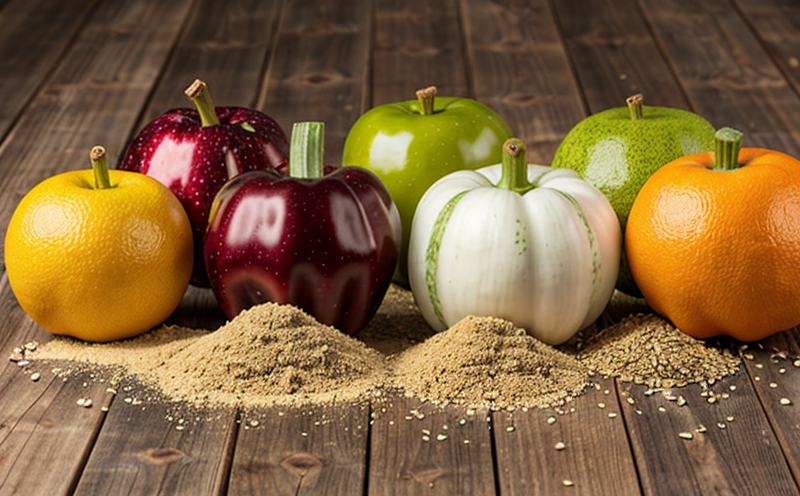ISO 13720 Pseudomonas spp. Testing in Fresh Produce
The ISO 13720 standard is specifically designed to detect and quantify Pseudomonas species on food surfaces, including fresh produce such as fruits, vegetables, and grains. This testing service ensures the microbiological safety of fresh produce by identifying potential pathogens that can spoil or cause contamination.
Pseudomonas spp., a diverse genus within the family Pseudomonadaceae, is widespread in nature and often present on plant surfaces, particularly in environments with high humidity. Common species include Pseudomonas aeruginosa, Pseudomonas fluorescens, and Pseudomonas syringae. These bacteria are known for causing post-harvest decay, which can lead to significant economic losses in the food industry.
The testing process involves several critical steps. Initially, samples from the produce must be collected using aseptic techniques. The samples are then homogenized and plated on selective media that promotes Pseudomonas growth. This step is crucial for isolating the bacteria from other microorganisms present in the sample.
Following incubation at optimal conditions, colonies suspected to be Pseudomonas spp. are identified using biochemical tests and molecular techniques such as PCR (Polymerase Chain Reaction). The standard requires that all positive samples must undergo further confirmation by sequencing or other reliable methods to ensure accuracy.
The ISO 13720 protocol specifies strict criteria for reporting results, including the number of colony-forming units (CFUs) per gram or square centimeter. This quantitative information is essential for producers and processors to assess compliance with food safety regulations.
| Applied Standards | Description |
|---|---|
| ISO 13720:2016 | Microbiology of Food and Animal Feed - Determination of Pseudomonas spp. on food surfaces by culture method. |
| ASTM E1945-18 | Standard Practice for the Collection, Preparation, Packaging, Preservation, Transportation, Storage, and Receipt of Fresh Fruit and Vegetables for Microbiological Testing. |
The testing process is not only a compliance requirement but also an essential tool in quality control. By detecting Pseudomonas spp., processors can implement corrective actions to prevent spoilage, extend shelf life, and maintain the integrity of their products.
Our laboratory adheres strictly to ISO 13720 guidelines, ensuring accurate and reliable results. This service is particularly beneficial for companies in the fresh produce sector who are concerned with maintaining food safety standards and preventing contamination.
Applied Standards
| Standard Code | Description |
|---|---|
| ISO 13720:2016 | Detailed methodology for the culture-based determination of Pseudomonas spp. on food surfaces. |
| ASTM E1945-18 | Standard practice covering the handling and transportation of fresh produce samples during microbiological testing. |
The ISO 13720 standard is a cornerstone in ensuring that Pseudomonas spp. are identified on food surfaces, including fruits, vegetables, and grains. Compliance with these standards ensures the safety of produce and helps prevent contamination during storage and transport.
The ASTM E1945-18 standard provides best practices for handling fresh produce samples, which is critical to maintaining sample integrity throughout the testing process. By following these guidelines, our laboratory ensures that all test results are accurate and reliable.
Industry Applications
The ISO 13720 Pseudomonas spp. Testing in Fresh Produce is widely used across various sectors within the food industry. This testing service plays a crucial role in ensuring the microbiological safety of fresh produce, which is essential for maintaining consumer confidence and compliance with regulatory requirements.
- Fresh produce suppliers
- Food processors
- Retailers
- Logistics and transportation companies
In addition to ensuring food safety, this testing service also helps in identifying the source of contamination. This information is invaluable for implementing corrective actions that can prevent future occurrences.
| Industry Applications | Description |
|---|---|
| Fresh produce suppliers | Evaluating microbial quality before distribution to ensure compliance with safety standards. |
| Food processors | Detecting Pseudomonas spp. during production to maintain product integrity and shelf life. |
| Retailers | Safeguarding the quality of fresh produce for sale, ensuring customer satisfaction and safety. |
| Logistics and transportation companies | Monitoring microbial contamination during transport to prevent spoilage and maintain product freshness. |
The results from ISO 13720 testing are critical for these industries, helping them meet regulatory requirements and enhance the quality of their products. By partnering with our laboratory, companies can ensure that they are adhering to the highest standards in microbiological testing.
Competitive Advantage and Market Impact
- Ensures compliance with international standards for food safety
- Provides accurate data on Pseudomonas spp. contamination levels
- Aids in the development of strategies to prevent post-harvest decay
- Enhances brand reputation and consumer trust through transparent reporting
- Saves time and resources by identifying issues early in the production process
- Supports continuous improvement efforts within the supply chain
The ISO 13720 Pseudomonas spp. Testing service offers significant competitive advantages to companies operating in the fresh produce sector. By detecting Pseudomonas spp. early, businesses can implement preventive measures that reduce spoilage and extend shelf life. This not only improves product quality but also enhances profitability.
In an increasingly globalized market, maintaining compliance with international standards is crucial for brand reputation and consumer trust. Our laboratory’s expertise in this area ensures that companies are meeting the highest safety and quality benchmarks.





